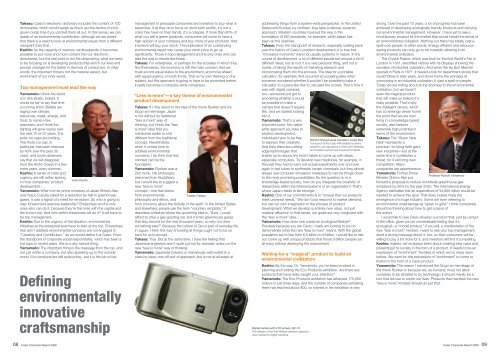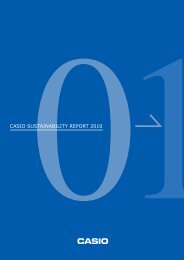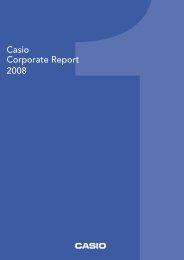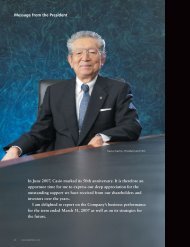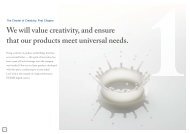Casio Computer Co. Ltd
Corporate Report 2009 all pages - Casio
Corporate Report 2009 all pages - Casio
- No tags were found...
You also want an ePaper? Increase the reach of your titles
YUMPU automatically turns print PDFs into web optimized ePapers that Google loves.
Takasu: <strong>Casio</strong>’s electronic dictionary includes the content of 100<br />
dictionaries, which would weigh as much as nine-tenths of a fullgrown<br />
cedar tree if you printed them all out. In that sense, we can<br />
speak of an environmental contribution, although we are aware<br />
that there is a need to look at environmental issues from a different<br />
viewpoint than that.<br />
Kashio: As the capacity of memory cards expands, it becomes<br />
possible to put more and more content into our electronic<br />
dictionaries, but the real point is not the downsizing; what we need<br />
to be focusing on is developing products that enrich our lives and<br />
prompt changes for the better in the lives of consumers. In other<br />
words, the important thing is not the material aspect, but<br />
enrichment of our inner world.<br />
Top management must lead the way<br />
Yamamoto: I think the world<br />
is in dire straits, indeed. It<br />
would be fair to say that time<br />
is running short. Battles are<br />
raging over climate,<br />
resources, water, energy, and<br />
food, to name a few<br />
examples, and I think the<br />
fighting will grow worse over<br />
the next 10 or 20 years. The<br />
polar ice caps are melting.<br />
The Arctic ice cap, in<br />
particular, has been reduced<br />
by 40% over the past 30<br />
years, and some observers<br />
say that ice will disappear<br />
from the Arctic Ocean in a few<br />
more years, every summer.<br />
Kashio: A sense of crisis and<br />
urgency are still rather lacking<br />
Yukio Kashio<br />
in most companies’ product<br />
development.<br />
Yamamoto: When former prime ministers of Japan Shinzo Abe<br />
and Yasuo Fukuda called for a reduction by half in greenhouse<br />
gases, it was a signal of a need for revolution. So who is going to<br />
step forward and exercise leadership? Enterprises are the only<br />
ones who can do it, because they’re the ones with the capital and<br />
the know-how. And who within enterprises will do it? It will have to<br />
be top management.<br />
Kashio: Due to the urgency of the situation, environmental<br />
initiatives at the enterprise level have to start at the top. Enterprises<br />
that don’t address environmental concerns are not engaged in<br />
“Creativity and <strong>Co</strong>ntribution,” as we would define it at <strong>Casio</strong>. From<br />
the standpoint of corporate social responsibility, which has been a<br />
hot topic in recent years, this is a very natural thing.<br />
Yamamoto: The important thing is the message from the top, and<br />
not just within a company, but also speaking up to the outside<br />
world. Eco-products are still quite pricey, but it is the job of top<br />
Defining<br />
environmentally<br />
innovative<br />
craftsmanship<br />
management to persuade consumers and investors to buy what is<br />
expensive. If all they do is focus on short-term profits, it’s not a<br />
crisis they have on their hands, it’s a collapse. If more than 80% of<br />
what you sell is green products, consumers will come to have a<br />
high opinion of your company and buy more of your products. And<br />
investors will buy your stock. The publication of an outstanding<br />
environmental report can cause your stock price to go up<br />
significantly. Those in top management are the only ones who can<br />
lead the way to results like these.<br />
Takasu: For enterprises, or perhaps for the societies in which they<br />
find themselves, the economy is still the main concern. But we<br />
must accord equal status to the environment, and move ahead<br />
with equal urgency on both fronts. That is my own thinking on the<br />
subject, but this approach is going to have to be promoted before<br />
it really becomes a company-wide consensus.<br />
“Less is more”—a key theme of environmental<br />
product development<br />
Takasu: If I may return to the idea of the monk Ryokan and his<br />
Gogo-an hermitage, Japan<br />
is not without its traditional<br />
“less is more” way of<br />
thinking, but I think the “less<br />
is more” idea that you<br />
mentioned earlier is a bit<br />
different from the traditional<br />
concept. Nevertheless,<br />
when it comes time to<br />
address environmental<br />
concerns, I do think that this<br />
mindset can be the<br />
foundation.<br />
Yamamoto: Ryokan was a<br />
Zen monk. His philosophy<br />
stemmed from Buddhism,<br />
but I would like to suggest a<br />
new “less is more”<br />
concept—one that stems<br />
from environmental<br />
Tadashi Takasu<br />
philosophy and ethics, and<br />
from concerns about the finitude of the earth. In the United States<br />
and elsewhere, people use the term “voluntary simplicity.” It<br />
describes a lifestyle where the governing idea is, “Sure, I could<br />
afford to drive a gas-guzzling car, but it emits greenhouse gases<br />
that stay around for the next thousand years, so why not drive<br />
something else?” Because the culture of Zen is part of everyday life<br />
in Japan, I think this way of looking at things ought not to be so<br />
hard for us to accept.<br />
Takasu: True. But at the same time, I have the feeling that<br />
Japanese engineers aren’t quite cut out for dramatic action on the<br />
new “less is more” way of thinking.<br />
Yamamoto: Japanese industry is marvelously well suited to a<br />
case-by-case, one-off sort of approach, but is not at all adept at<br />
addressing things from a system-wide perspective. In the United<br />
States and Europe, by contrast, they take a rational, systemic<br />
approach. Western countries have led the way in the<br />
formulation of ISO standards, for example, while Japan has<br />
been on the sidelines.<br />
Takasu: From the standpoint of research, especially looking back<br />
over the history of <strong>Casio</strong>’s product development, it is true that<br />
“innovative moments” were not usually systemic in nature. In the<br />
course of development, a lot of different people bat around a lot of<br />
different ideas, but at root it is a very personal thing, and not a<br />
matter of taking the results of marketing research and<br />
incorporating them into the process. The idea for a portable<br />
calculator, for example, first occurred at a bowling alley when<br />
someone wondered whether it wouldn’t be possible to take a<br />
calculator to a place like that to calculate the scores. That’s how it<br />
was with digital cameras,<br />
too—someone just got to<br />
wondering whether it would<br />
be possible to make a<br />
camera that doesn’t require<br />
film, and we started looking<br />
into it.<br />
Yamamoto: That’s a very<br />
important point. No matter<br />
what approach you take to<br />
product development,<br />
individuals have to be free<br />
to express their creativity.<br />
And then there are cuttingedge<br />
technologies that<br />
enable us to reduce the time it takes to come up with ideas,<br />
especially computers. To develop new medicines, for example, in<br />
the past they had to carry out actual experiments over and over<br />
again in test tubes to synthesize certain chemicals, but they almost<br />
always use computer simulation nowadays to narrow things down<br />
to the most promising possibilities. So the question is, in a<br />
knowledge-based society, how do you integrate the creativity of<br />
researchers within the internal systems of an organization? That’s<br />
where Japan needs to be stronger.<br />
Kashio: One of our commitments is to “ensure that our products<br />
meet universal needs.” We don’t just respond to market demand,<br />
but use our own imagination in the process of product<br />
development. What we develop is entirely new value, not just<br />
material affluence. In that sense, our goals are very congruent with<br />
the “less is more” idea.<br />
Yamamoto: How does one create an ecological lifestyle?<br />
Precisely because you are <strong>Casio</strong>, I really am looking to you to<br />
demonstrate what the new “less is more” means. With the global<br />
population set to rise from 6.5 billion to 9 billion, I would like to see<br />
you come up with unique products that those 9 billion people can<br />
all enjoy without destroying the environment.<br />
Waiting for a “magical” product to build an<br />
environmental civilization<br />
Kashio: By the way, Dr. Yamamoto, you’ve been involved in<br />
planning and holding the Eco-Products exhibition. Are there any<br />
products that have really caught your attention?<br />
Yamamoto: The Eco-Products exhibition has attracted 175,000<br />
visitors in just three days, and the number of companies exhibiting<br />
there has reached about 800, so interest in the exhibition is very<br />
Digital camera with LCD screen, QV-10<br />
The release of the first filmless camera created a<br />
new market for digital cameras.<br />
World’s first personal calculator, <strong>Casio</strong> Mini<br />
The launch of the <strong>Casio</strong> Mini enabled ordinary<br />
people to use calculators on their own desktops,<br />
and created a whole new culture and market.<br />
strong. Over the past 10 years, a lot of progress has been<br />
achieved in developing ecologically friendly products and carrying<br />
out environmental management. However, I have yet to see a<br />
revolutionary product hit the market that would herald the arrival of<br />
an environmental civilization. Nothing out there has totally cast a<br />
spell over people, in other words. Energy-efficient and resourcesaving<br />
products can only go so far towards ushering in an<br />
environmental civilization.<br />
The Crystal Palace, which was built for the first World’s Fair in<br />
London in 1851, electrified visitors with its displays showing the<br />
wonders of industrial civilization. And when the Au Bon Marché<br />
opened in Paris in 1871, it blazed a trail for department stores that<br />
would follow in later years, and drove home the wonders of<br />
consuming in an industrial civilization. It cast a spell on people.<br />
Today we are milling about at the doorway to the environmental<br />
civilization, but we haven’t<br />
seen the magical product<br />
that will make us believe it’s<br />
really possible. That’s why<br />
the intelligent device, which<br />
has so strikingly driven home<br />
the point that we are now<br />
living in a knowledge-based<br />
society, also harbors<br />
extremely high potential in<br />
terms of the environment.<br />
Takasu: The “Green New<br />
Deal” represents a<br />
promise—to bring forth giant<br />
new industries—but at the<br />
same time it constitutes a<br />
threat, for it will bring new<br />
competition. Many<br />
companies are apprehensive.<br />
Yamamoto: Former Prime<br />
Professor Ryoichi Yamamoto<br />
Minister Shinzo Abe put<br />
forward a proposal to reduce worldwide greenhouse gas<br />
emissions by 50% by the year 2050. The International Energy<br />
Agency estimates that an expenditure of ¥4,800 trillion would be<br />
needed to achieve this goal. That does indeed imply the<br />
emergence of a huge industry. Some are even referring to<br />
environmental undertakings as “green to gold.” I think companies<br />
should be thinking about how to get a piece of<br />
the action!<br />
I would like to see <strong>Casio</strong> develop a product that, just by using it<br />
in the office, gives you an unmistakable feeling that it’s<br />
ecological—a “model product,” if you will, a manifestation of the<br />
new “less is more” mindset. I want to see your top management<br />
send a strong message about it, too, so that consumers will be<br />
willing to pay a bit more for it, and investors will find it compelling.<br />
Kashio: Indeed, we’ve always been about creating new value and<br />
presenting it to society in the form of a product. It needs to be an<br />
expression of “enrichment” the likes of which we’ve never seen<br />
before. We want for this expression of “enrichment” to come to<br />
fruition in the form of a <strong>Casio</strong> product.<br />
Yamamoto: The reason I mentioned the Gogo-an hermitage of<br />
the monk Ryokan is because we, as humans, must not allow<br />
ourselves to be dictated to by technology; it should merely be a<br />
tool that we use to enrich our lives. Products that manifest the new<br />
“less is more” mindset should do just that.<br />
08 <strong>Casio</strong> <strong>Co</strong>rporate Report 2009 <strong>Casio</strong> <strong>Co</strong>rporate Report 2009 09


